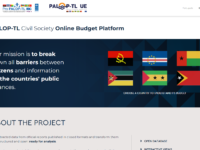Case Study
The multi-country PALOP-TL eBudget CSO Digital Platform for transparency & accountability

Civil Society Organisations and Ministries of Finances from the PALOP-TL countries (Angola, Cabo Verde, Guinea Bissau, Mozambique, São Tomé e Príncipe, Timor-Leste) developed the 1st ever transnational digital network for citizens’ fiscal literacy and participation in budget cycles. The Digital Platform uses data transparency tools with pictographic representation to simplify complex budgetary documents for the wider public, increasing transparency and accountability in public finance…




